
Darren Stanley Hayes is an Australian singer, songwriter, music producer and composer. He was the frontman and singer of the pop duo Savage Garden until their disbandment. Their 1997 album Savage Garden peaked at number 1 in Australia, number 2 in the United Kingdom and number 3 in the United States. It spawned the singles "I Want You", "To the Moon and Back", and Australian and US number 1 "Truly Madly Deeply". The duo followed the success of their debut album with Affirmation (1999), which provided additional hits such as Australian and US number 1 "I Knew I Loved You", and Australian number 3 "The Animal Song". Savage Garden parted ways in 2001.

Captain & Tennille were American recording artists whose primary success occurred in the 1970s. The husband-and-wife team were "Captain" Daryl Dragon (1942–2019) and Toni Tennille. They have five albums certified gold or platinum and scored numerous hits on the US singles charts, the most enduring of which included "Love Will Keep Us Together", "Do That to Me One More Time", and "Muskrat Love". They hosted their own television variety series on ABC in 1976–77.
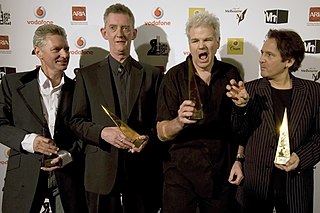
Dragon are a New Zealand rock band which was formed in Auckland in January 1972, and, from 1975, based in Sydney, New South Wales, Australia. The band was originally fronted by singer Graeme Collins, but rose to fame with singer Marc Hunter and is currently led by his brother, bass player and co-founder Todd Hunter. The group performed, and released material, under the name Hunter in Europe and the United States during 1987.
Sharon Lea O'Neill is a New Zealand singer-songwriter and pianist, who had an Australasian hit single in 1983 with "Maxine" which reached No. 16 on both the Australian Kent Music Report and Recording Industry Association of New Zealand charts.

Paul Williams, known professionally as Billy Paul, was a Grammy Award-winning American soul singer, known for his 1972 No. 1 single "Me and Mrs. Jones", as well as the 1973 album and single War of the Gods, which blends his more conventional pop, soul, and funk styles with electronic and psychedelic influences.

"Daydream Believer" is a song composed by American songwriter John Stewart shortly before he left The Kingston Trio. It was originally recorded by the Monkees, with Davy Jones singing the lead. The single reached No. 1 on the U.S. Billboard Hot 100 chart in December 1967, remaining there for four weeks, and peaked at No. 5 on the UK Singles Chart. It was the Monkees' third and last No. 1 hit in the U.S.

"Do It Again" is a song by the American rock band the Beach Boys that was released as a standalone single on July 8, 1968. It was written by Brian Wilson and Mike Love as a self-conscious callback to the group's earlier surf image, which they had not embraced since 1964. Love and Wilson also share the lead vocal on the song.

"De Do Do Do, De Da Da Da" is a song by the Police, released as a single in 1980. Released as the British second single from the album Zenyatta Mondatta, the song was written by Sting as a comment on how people love simple-sounding songs. The song was re-recorded in 1986 as "De Do Do Do, De Da Da Da '86" but not released until 1995.

"Pressure" is a 1982 song by American musician Billy Joel from the album The Nylon Curtain, released as the album's first single and reached at number 20 on the US Billboard Hot 100. The synthesizer-driven rock song tells about the pressure of creating and the pressure of being a provider.

"You Don't Own Me" is a popular song written by Philadelphia songwriters John Madara and David White and recorded by Lesley Gore in 1963, when Gore was 17 years old. The song was Gore's second most successful recording and her last top-ten single. Gore herself considered it to be her signature song claiming “I just can’t find anything stronger to be honest with you, it’s a song that just grows every time you do it.”

Edge of Winter is the sixth studio album by New Zealand singer-songwriter Sharon O'Neill. The album was released by Polydor in August 1990. The album marks O'Neill's last solo studio album of new material. All the songs were written by O'Neill or co-written with guitarist/keyboardist Alan Mansfield of Dragon, who is also her domestic partner. O'Neil and Mansfield had written tracks for Dragon including "Young Years" for their 1989 album Bondi Road. Mansfield also produced the album.
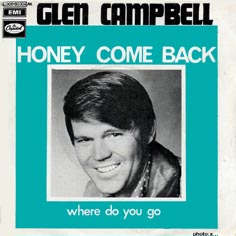
"Honey Come Back" is a song written by Jimmy Webb, and recorded by the American country music artist Glen Campbell. It would become a major hit for him.
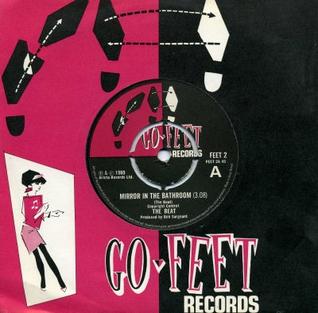
"Mirror in the Bathroom" is a single by the British ska band the Beat, released as a single in 1980 from their debut studio album I Just Can't Stop It. It reached number 4 on the UK Singles Chart and consequently was their highest charting release in the UK until 1983. It was released again in 1995 as a 12" single and early in 1996 as a CD single to promote B.P.M.: The Very Best of the Beat. The reissued single reached number 44 in 1996.

"Maxine" is a song by New Zealand singer and songwriter Sharon O'Neill. The song was released in May 1983 as the second single from her fourth studio album, Foreign Affairs (1983). The song peaked at number 16 in Australia and New Zealand. It remain's O'Neill's highest charting single in Australia.
The discography of New Zealand singer Sharon O'Neill consists of six studio albums, one live album and four compilations.
"Asian Paradise" is a song by New Zealand singer and songwriter Sharon O'Neill. The song was released in April 1980 as the third single from her second studio album, Sharon O'Neill (1980)

"Danced in the Fire" is a song by New Zealand singer songwriter Sharon O'Neill. The song was released in February 1988 as the second single from her fifth studio album, Danced in the Fire (1987).

Sharon O'Neill is the second studio album by New Zealand singer and songwriter Sharon O'Neill. Sharon O'Neill peaked at No. 5 in New Zealand in March 1980. The album was released in Australia in August 1980 under the titled Words, with the inclusion of "How Do You Talk to Boys".
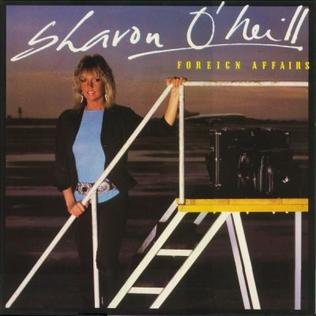
Foreign Affairs is the fourth studio album by New Zealand singer and songwriter Sharon O'Neill. It was O'Neill's final studio album release on CBS. The album was certified Gold in New Zealand.
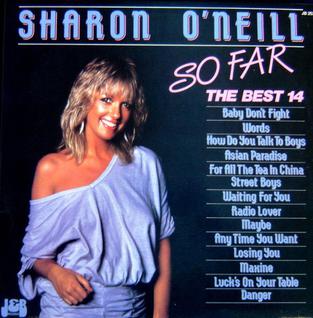
So Far is the first compilation album from New Zealand-born Australian pop singer Sharon O'Neill. The album was released on CBS Records' budget label J&B. The album was released during a period of legal dispute between O'Neill and CBS.
















